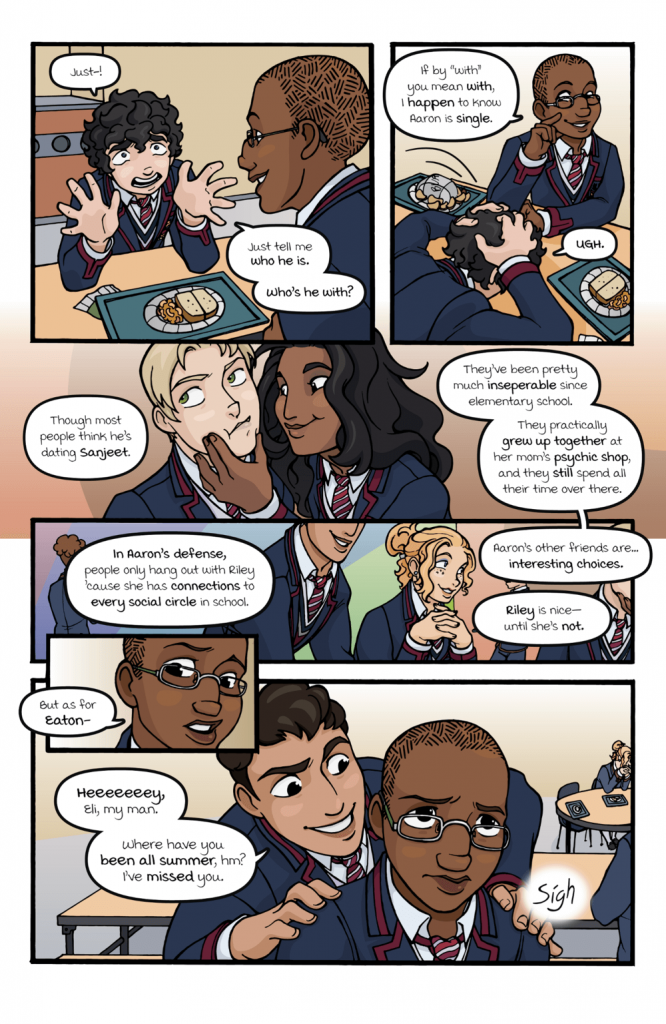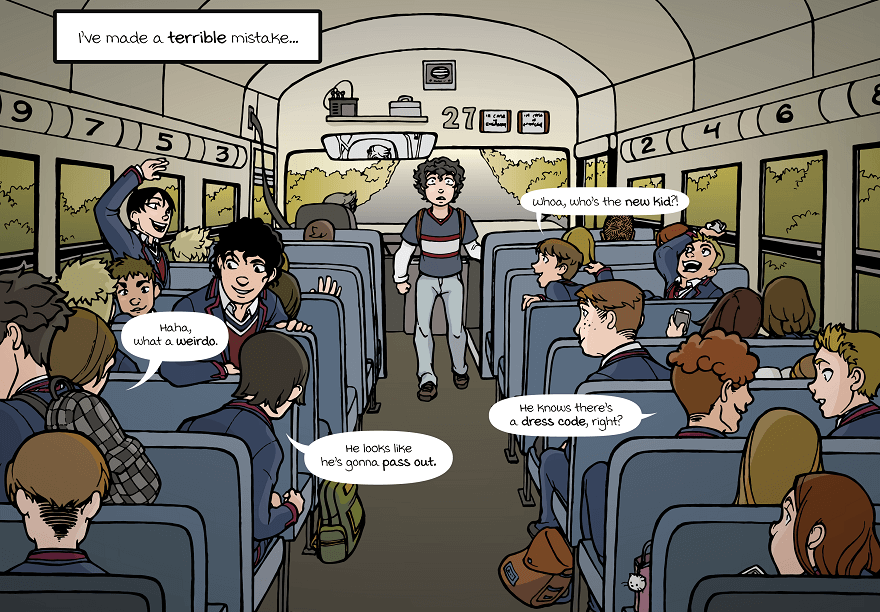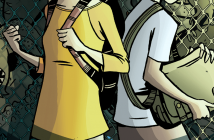Web comics are all the rage. Pushing boundaries and playing with tropes and themes that some mainstream printed comics won’t, they’re creative and fun. One of those comics? Magical Boy Basil.
Basil is an average teenage kid until a life-shattering event transplants his family to the sleepy town of Tanglewood. All he wants is a return to normalcy and the comfort of a familiar routine, but here, magic runs amok and teenage magicians work undercover to maintain the balance of the universe. Unfortunately for Basil, his dreams of a quiet life might be gone forever when he finds himself irrevocably tangled in more danger, school work, and imminent disaster than he can handle.
Magical Boy Basil is a free-to-read weekly updated web comic. You can begin reading on the Magical Boy Basil website now. Creators Rebeckah Murray and Jill Marie Hackett talked to us below about the series and what they love about web comics.
 Basil is a normal boy until he ends up in Tanglewood. Can you tell us a little about Basil and the cast of teenage magicians who try to keep the balance of the universe?
Basil is a normal boy until he ends up in Tanglewood. Can you tell us a little about Basil and the cast of teenage magicians who try to keep the balance of the universe?
Beckah: Well, Basil thinks he’s normal. And to a certain degree, he kind of is just your average slightly-more-anxious-than-
Aaron might seem like your typical ‘ice queen’ type character – aloof, hard to reach. But he’s actually more than willing to interact with and help his peers. Like his “white knight” costume implies, he’s very chivalrous, professional and mature. He just… has difficulty handling and displaying emotions. Which might make him come off as standoffish at first.
His best friend, Sanjeet, certainly knows better! Sanjeet is an extraordinarily bright, diligent and free-wheeling girl. She often carries herself like a ‘prim and proper’ student in front of adults, but she’s got a great sense of humor and has probably the most adventurous spirit out of the entire group.
Riley and Eaton are just as complex as the others but I don’t want to say much about them (spoilers, after all!). You might see them as very aggressive in the beginning, and as the story progresses, their true personae will start to shine through.
Lastly – Noah! I can’t say much about him at all but he’s the ‘every man’ kind of guy. Loves to make people smile, feel comfortable in social situations. Basil will be meeting him very soon. He’s got a pretty interesting relationship with the magical crew, that’s for sure!
And because it’s important to us, everyone mentioned above is definitely queer in some way. Gay, Lesbian, Bisexual, Demisexual. We’ll leave it up to you guys to find out who!

Jill: Gotta love Beckah for trying to keep spoilers under wraps! Let me see if I can fill in some of the gaps for you without giving anything away.
The great thing about Basil and Aaron is that they’re polar opposites. Basil is always bursting with energy in all kinds of spiraling directions, and Aaron is extremely focused and private. The contrast in their personalities creates a lot of trouble for them at the beginning of the story- Basil and Aaron both sense that they could probably like each other, but extenuating circumstance and their inability to really understand each other gets in the way. They both deal with conflict in different ways, and because of this, they’ll often be in conflict with each other. It’s through these confrontations that they finally begin to get each other, and that’s when their relationship begins to shift.
I won’t add much to Sanjeet except to say that Sanjeet struggles a lot with who she is versus who she is expected to be. Her teachers and her family have expectations for who Sanjeet will grow up to be. She’s a bright and promising girl, after all. She’s on the student council, she’s involved in extra curricular activities, she holds a job at her mother’s shop, she gets straight A’s. It’s almost like she’s too perfect to be true, and Sanjeet secretly believes that. On the other hand, if she isn’t this perfect person that everyone keeps expecting her to be, then who is she really? And is that okay?
Riley is outgoing and socially clever. Its like she always knows exactly what to say and when to say it- and unfortunately it’s not always nice. Riley has the capacity to be everyone’s friend and everyone’s enemy at the same time. Drama follows her everywhere, and she seems to feed on it. The problem with drama is that it tends to suck people in, and, as Basil will soon learn, once she’s got someone, it’s difficult to break free.
Eaton, on the other hand, has no subtlety. He’s an outright bully. Eaton doesn’t think before he speaks, he’s unafraid of physical confrontation, and for some reason, he always seems to get away with it. How is that possible? Why do people act like that? How do you deal with someone like that? Everyone knows someone like Eaton – they may even be Eaton – and our story explores the problems that he represents. He’s a character whose personality and impact need a lot of untangling in order to understand, so Basil will be seeing a lot of him.
I’ll add a little bit more to Beckah’s description of Noah. Noah is a friendly and intuitive guy that everyone should like, and yet somehow he’s the magical outcast. Maybe Aaron’s crew has turned sour with the introduction of Riley and Eaton to his group, or maybe Noah isn’t quite what he seems. Either way, we’ll be seeing a lot of Noah starting in Chapter 3 as Basil begins to reveal the depth of magical madness in Tanglewood.
So far as the familiars are concerned, their personalities are usually fairly matched to their assigned magicians. Familiars select their magicians based on their perception of strengths. So for example, Twill is a calculating bird-type familiar who believes that strength lies in intellect, so he selects Sanjeet as his magician. Twill has a much colder personality than Sanjeet, but they share enough core values that they get along very well.
Someone who hasn’t been mentioned yet is Eli, who is not a magician but is still key to the story. Eli is Basil’s best friend who makes it his job to record Basil’s magical adventures and provide Basil with the information and material he needs to unravel the mystery of Tanglewood. Eli is a bit of an oddball and social outcast, but that means he fits well with the weird new-kid. More than anyone in the story, Eli and Basil help each other most to get through the problems they can’t share with anyone else. They’re easily life-long friends.
Fantasy worldbuilding is hard to do. How does the magic in your world work?
Beckah: It is tough! And it’s something I love, love, love to do. But honestly, Jill’s the magic master in Basil’s world here so I’ll defer to her on the technicalities. I can say that I’ve always been fascinated by how inanimate objects tend to acquire all this emotional energy from their owners based on time and sentimental value, and that actually has a major function in this story.
Jill: The concept of magic and monsters goes back as far as humans do, so I believe that “fantasy world-building” is something that we all naturally do by attempting to rationalize the fantastic. The core principle is to start with a seemingly impossible or unexplained concept, and then try to apply as much reality to it as you’re able.
The “unexplained” concept might start fairly innocuous. The magic system we developed for Magical Boy Basil got its inspiration from the question of “Why do people get so attached to stuff?” People hold onto everything from years old movie stubs to family heirlooms. Communities will protect a crumbling landmark or trees older than the town. We began to wonder if these items held intrinsic value without the human attachment to them. We began to wonder what kind of real-world power these items held. We began to wonder if the same item could mean different things to different people, and how that could affect its impact on the world.
In Magical Boy Basil, magicians derive their power by activating the human energy behind meaningful objects. With the help of their familiar, each magician interprets that energy according to their worldview, which is represented by their magical themes. Aaron is the White Knight. Noah is the Architect. Eaton is the Rend. And Basil? Well, you’ll just have to find out!
When designing our magic-system, we also considered that we’re telling the story in a visual format. We wanted to find a way to visually express the connection that human energy represents in our world. Out of this need, we developed a string-magic concept. All magical energy (all human bond) is represented as strings that surround meaningful items. Magicians have the capacity to see, activate, and manipulate these strings, which allows them to access and use the energy that surrounds an item. Strings can be manipulated very artfully, or even combined with each other in order to create stronger and more complex magical items. Strings, however, can also be tangled, and that’s where the monsters come in.
Tangles are monsters created from corrupted magical energy. (Starting to see the metaphors here? All fantastic elements are actually grounded in reality.) The more energy attached to that object, the stronger the tangle will be. Tangles run rampant, operating under a basic instinct to consume all other energy it encounters. Sometimes tangles are just a nuisance, but serious tangles are capable of creating massive property damage or can even devour human souls. These are the monsters that magicians are sworn to fight. Balance must be maintained, or chaos will reign.

During the Fantastic Queers and Where To Find Them panel at Flamecon this year, somebody asked about building a queer-friendly magical world. How did you set about doing that? How do you reflect it in both the writing and the artwork?
Beckah: I’m one of those people where everything I touch is queer. In every world I create, there are queer characters. It really comes down to deciding- How does the rest of this world react to that? Some parts do, some parts don’t. I usually treat it like the world we live in- Write about what you know, you know? But make sure you research whatever you’re not too familiar with. In Basil’s case, he does pretty much live in a world like ours and there are people in that world who don’t react well to queerness. It’s maybe a bit more tolerant in Tanglewood. At the very worst, people there are just… confused by it. Some of the characters are comfortable with who they are, some of them aren’t. Some of them have no idea what to call themselves to begin with! As for the art, we’re going for a mix between classic shoujo manga and western cartoon style. So very simple, very bold. You’ll see that some of the teenage magicians are very comfortable shirking gender roles and some of them aren’t (initially, at least).
Jill: I think a lot about constructing a queer-friendly story is in considering whom the main character interacts with and what you, as a creator, want to say about that interaction. If a queer main character has queer best friends and an open family, you’re going to say something different than a queer main character in a queer-hostile community. Those two worlds exist in real life, and those two worlds have very different tones and themes that a story can work with.
When we started Magical Boy Basil, we knew we wanted to create a space where people can find main characters like them without feeling like they were under attack for it. Excellent stories out there do deal with homophobia, and some forms of prejudice are touched on in our story when appropriate, but we didn’t want Magical Boy Basil to be about how to overcome hate- we wanted it to be about how to champion love. It was an atmospheric decision on our part.
An important factor in creating Magical Boy Basil’s queer-friendly world is Eli, Basil’s best friend, who is openly gay. He is a central character who is loud and proud, and equally important is that Basil rolls with that fact with the same ease as learning that Eli is also a photographer. In Magical Boy Basil, queerness is interesting but normalized (for the most part) which makes our story a safe space for readers to enjoy queer characters in fantastical plots without prejudice.
What do you want people to know about digital comics?
Beckah: It’s not easy to make them! Even if you just work on it in your spare time, if you really want to get your story out there and reach readers, you’ve got to be consistent and approachable. Part of building a community is learning to let go of the fear that you aren’t good enough and just… do it. Put it out there. You might not be the best on the net (or maybe you are!) but someone out there is going to find you and love your work and the fact that you’ve now got the opportunity to open a discourse with someone on something you created- like, wow, is that magical itself or what?
Jill: Digital comics are an excellent format for getting stories to people who need them most. And I do think that people need stories. Stories satisfy a human craving for connection, and utilizing a digital and visual format is a double-whammy for reaching out with your message. Digital comics can be easily distributed, made freely available, and become meaningful for a whole host of people. It’s a worthwhile pursuit- just know that it is all-consuming as well. Beckah and I willingly work nearly all our evenings and weekends in order to produce Magical Boy Basil. You need an insane level of passion for the art form in order to maintain the effort necessary for creating comics. Props to anyone willing to try!
What else do you want people to know about Magical Boy Basil?
Beckah: Basil is a special project for both of us, of course, but for me it also carries a lot of personal significance. I won’t spoil anything for you, but throughout the story you’ll learn pretty early on that Basil is dealing with some really intense emotions. I’ve suffered a very close personal loss myself, and so Basil is a way to help work through it in a positive and creative way. An item that’s already shown up in the story is actually based on a memento I have of the person I lost. I hope people with similar conflicts can find some comfort in this little anxious ball of awkward as they learn more about him.
Jill: Magical Boy Basil is more than just a comic. It’s a community that we’re trying to build, made up of friendly readers and fellow comic creators. We’re using Magical Boy Basil as a platform to discuss meaningful subjects in a safe and entertaining space. Our comic can be just that, a comic, but the potential is there to take so much more away from it. I’m excited to watch it grow every day.
What other YA web comics would you recommend to readers of Magical Boy Basil?
Beckah: Well, all of them, really! But if I had to pick some favorites, man, that’s tough… The Less Than Epic Adventures of TJ and Amal is kind of classic at this point (You go, E.K. Weaver!) though it does contain mature content so be careful about that. And this next one isn’t queer, per say, but boy is it a great time! Paranatural is just an incredible amount of fun. It’s a little reminiscent of Boxer Hockey (so good!) but certainly it’s own brand of comedy and style (and genre- the former is supernatural comedy, the latter is sports comedy). If you are looking for good queer webcomics, I would suggest Khaos Komix. It starts off a bit rough but their treatment of lesbian, gay, and trans characters is very natural and positive. Oh, and Missing Monday is great too!
Jill: I’ve been reading Awaken recently and find it very enjoyable. Other than that, all of the above!


